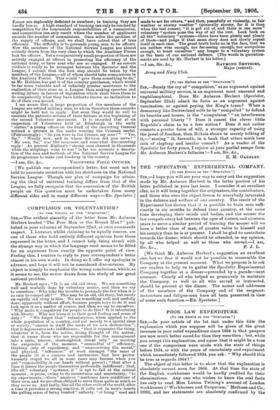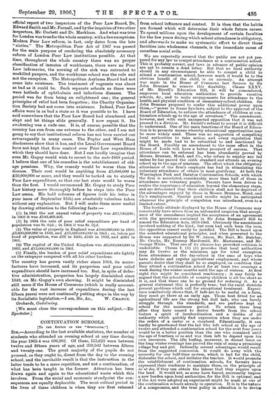POOR LAW EXPENDITURE.
[TO THE EDITOR OF TIIR .SPECTATOR." J
SIR,—In your article of the 1st inst. under this title the explanation which you suppose will be given of the great increase in poor relief expenditure since 1864 is that paupers are now much better cared for than they were then ; but, while you accept this explanation, and agree that it might be a true one if the comparison were made with the state of things before 1834, or with the years of uncertainty and experiment which immediately followed 1834, you ask : "Why should this be true as regards 1864?"
The object of this letter is to show that the explanation is absolutely correct even for 1864. At that time the state of the English workhouses would be hardly credited for their abominations. Any one who wishes to know the real facts has only to read Miss Louisa Twining's account of London workhouses (" Workhouses and Pauperism," Methuen and Co., 1898), and her statements are absolutely confirmed by the official report of two inspectors of the Poor Law Board, Dr. Edward Smith and Mr. Farm.11, and by the inquiries of two other inspectors, Mr. Corbett and Dr. Markham. And what was true for London was true for the whole country, with a few exceptions. Modern Poor Law reform, in fact, only dates from the late
sixties." The Metropolitan Poor Act of 1867 was passed for the main purpose of rendering • the absolutely necessary reform of London Poor Law institutions possible. At that time, throughout the whole country there was no proper classification of inmates of workhouses, there were no Poor Law infirmaries, the nursing of the sick was entrusted to unskilled paupers, and the workhouse school was the rule and not the exception. The Metropolitan Asylums Board had not come into existence. The treatment of vagrants was about as bad as it could be. Such separate schools as there were were hotbeds of ophthalmia and infectious diseases. The period was far from being an enlightened one ; the general principles of relief had been forgotten ; the Charity Organisa- tion Society had not come into existence. Indeed, Poor Law
affairs were in as bad a state as it was possible to be. I have said somewhere that the Poor Law Board had slumbered and slept and let things slide generally. I now repeat it. Its awakening was a rude one. It is, of course, possible that the country has run from one extreme to the other, and I am not going to say that institutional reform has not been carried out extravagantly in many cases. The Poplar and West Ham disclosures show that it has, and the Local Government Board have not kept that firm control over Poor Law expenditure which they should have done. But I can hardly imagine that even Mr. Gogay would wish to revert to the ante-1868 period. I believe that one of his remedies is the establishment of old- age pensions. Why, the remedy would be worse than the disease. Their cost would be anything from £5,000,000 to £20,000,000 or more, and they would be tacked on to strictly Poor Law expenditure, so that our last state would be worse than the first. I would recommend Mr. Gogay to study Poor
Law history more thoroughly before he steps into the Poor Law arena. His bald columns of figures (vide his letter in
your issue of September 15th) are absolutely valueless taken without any explanation. But I will make them more useful by drawing attention to the following facts :—
(1) In 1841 the net annual value of property was £62,540,030; in 1902 it was £143,469,405.
(2) In 1834 the rate of poor relief expenditure per head of population was 8s. 91d.; in 1904 it was 8s. Old.
- (3) The value of property in England was £100,000,000 in 1600, £3,600,000,000 in 1833, and £15,000,000,000 in 1901; or, taken per head of population, was £22 in 1600, £120 in 1833, and .6361 in 1901.
(4) The capital of the United Kingdom was £6,000,000,000 in 1865, and £15,000,000,000 in 1901.
(5) Finally, the burden of poor relief expenditure sits lightly on the ratepayer compared with all his other burdens.
The country has grown vastly richer since 1864, its manu- factures have increased, and its pauperism and poor relief expenditure should have increased too. But, in spite of defec- tive administration, pauperism has largely diminished since 1849, on Mr. Gogay's own showing. It might be diminished Still more if the House of Commons (which is really account- able for the vast increase of expenditure during the last fifteen years) were not continually putting stops in the way by
its Socialistic legislation.—I am, Sir, &c., W. CHANCE. Orchards, Godalming.
1.We must close the correspondence on this subject.—En Spectator.]











































 Previous page
Previous page